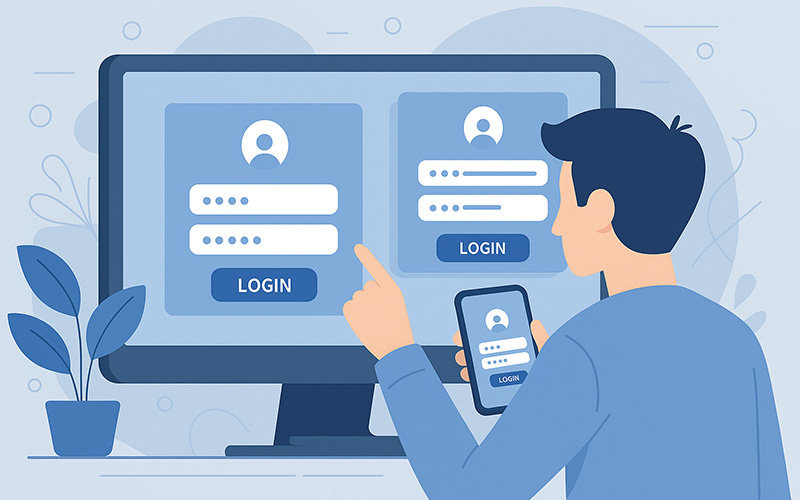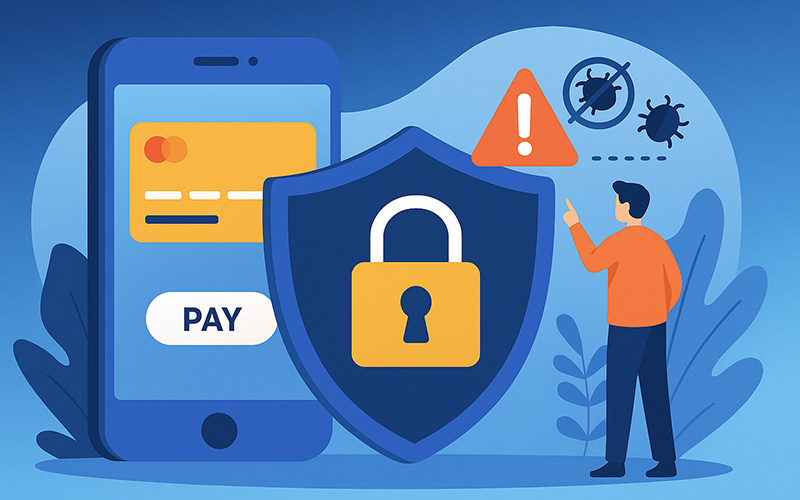Anti-Fraud Methods in the System of Electronic Micropayments
Main Dangers When There Is a Large Deposit Flow

Today, electronic micropayment systems have become an integral part of the iGaming sphere, e-commerce, and fintech. Services process thousands of operations per minute, but the transaction amount often does not exceed $10.
With a large volume, such transfers become targets for fraudsters. Entrepreneurs lose money and the trust of the audience, receive huge fines, and become the object of close attention from regulators.
Let us consider the key risks that online casino owners face:
Multi-Accounting
Fraudsters create dozens, and sometimes hundreds, of fake profiles using fake data, virtual phone numbers, or temporary e-mail addresses.
The purpose of manipulation is to seize welcome bonuses, free spins, or cashbacks that are given to new customers, as well as to gain an improper advantage in the game.
Disregard for multi-accounting can:
- lead to direct financial losses for operators, since incentives are always converted into real money;
- distort analytics (the system sees “new players”, although in fact, they are the same person);
- complicate the work of marketing campaigns, because ROI is often reduced due to fake profiles.
Theft of Payment Data
To illegally replenish accounts, intruders use confidential information from bank cards, as well as standard or cryptocurrency wallets.
First, a small “test” transaction is initiated using the stolen details to check if the card really works. If the monetary transfer is successful, the fraudster attempts to cash out the funds through the gambling platform.
Theft of payment data leads to the following problems for entrepreneurs:
- financial losses due to chargebacks;
- reputational damage (casinos may be blacklisted by several systems);
- legal claims if the innocence in supporting scammers is not proven.
Legalisation of Funds Through Microtransactions
Fraudsters can use iGaming platforms as a tool for money laundering.
The essence of the offence is the implementation of a large number of small payments that do not arouse suspicion.
Initially, criminals make small deposits from different sources. Then a game is played (often fictitious) to “whiten” transfers. The final stage is the withdrawal of money in a pure form through the application of another settlement method.
Legalisation of funds through microtransactions is associated with several risks:
- violation of AML (Anti-Money Laundering) requirements;
- the possibility of blocking operators' accounts by financial regulators.
Stolen Card Testing
This is one of the most common types of fraud in the micropayments segment.
Scammers make many small deposits ($0.50–2) to make sure that the bank card is valid and can be used to write off the money.
If the check is successful, larger purchases or resale in the shadow market take place.
Consequences for the owners of entertainment portals:
- the system is overburdened with microtransactions;
- increase in the number of chargebacks and fines from payment providers.
Chargeback Fraud
Offenders make a deposit using a card or e-wallet application, spend money in the game, and then initiate a refund through the bank or financial service. The reason for it is “unauthorised operation”.
Manipulations with this tool can be implemented in 2 ways:
- players place bets and lose, after which they report a fraudulent chargeback;
- scammers use someone else's payment details to replenish accounts, in order to then return funds to the “legitimate owner” (often a fictitious one).
In the first case, entrepreneurs lose not only the amount deposited by gamblers but also the commission for processing such transfers. At the same time, the chargeback rate increases. It may lead to the merchant account’s blocking by the PSP provider.
Anti-Fraud Methods in the Electronic Micropayment System

With a large flow of deposits, iGaming startups inevitably face offences. To minimise risks and not lose the audience’s trust, operators use multi-level security tools.
Behavioural Biometrics
This is the study of micropatterns of customers’ actions, which cannot be completely faked.
The system tracks and remembers the following parameters:
- typing speed when registering or entering data;
- mouse movements and swipes on mobile devices;
- pauses between clicks and response time to interface elements;
- non-standard actions (for example, instant filling out a form using a bot).
The implementation of behavioural biometrics solves a wide range of problems:
- identifies automated scripts and fake accounts;
- distinguishes real players from fraudsters who massively create profiles;
- reduces the risk of multi-accounting.
For example, the system will record that users register on the website and enter data in 1–2 seconds, but always in the same way. As a response to a possible violation, the program activates an anti-fraud trigger, and new profiles will be subject to additional verification or temporary freezing.
Device Fingerprinting
Each gadget (smartphone, PC, or smartwatch) leaves its unique digital mark, including dozens of parameters:
- IP address and its geography (as well as the coincidence or desynchronisation with the gambler’s geodata);
- browser characteristics (version, plugins, or interface language);
- hardware indicators (operating system, screen resolution, GPU, fonts, and cookies).
By analysing the login device, the owners of iGaming platforms can perform the following actions:
- compare the IP address with the database of known fraudulent applications and proxy networks;
- detect the use of anonymisers, VPNs, TOR, or other programs;
- block attempts to create multiple accounts from one device.
For example, entrepreneurs may have 20 “new” players. Fingerprint analytics will show that they all log in from the same laptop through different VPN addresses. The system will freeze such profiles or send them for additional anti-fraud scanning.
Transaction Scoring
This method means the dynamic monitoring of financial operations in real time.
The list of key tools includes:
- Automatic blocking. If, for example, 10 deposits are made from one bank card or e-wallet in a short time, such actions will be temporarily suspended.
- Dynamic limits. A beginner can transfer only $100 per day, and a proven player with a verified account — $1,000 or even more.
- Transaction scoring. Each operation is assigned a risk level that takes into account the source of payment, frequency of deposits, and the history of bets and visits to the entertainment site.
The use of the latter method provides such tangible benefits as:
- protection from stolen card testing;
- control over cashing out attempts through microtransactions;
- flexible adjustments of the tool depending on the specifics of the jurisdiction and types of gamblers.
Instant KYC/AML Checks

The fight against money laundering and fraud is one of the main requirements of regulators. The implementation of automated KYC/AML systems simplifies this task, making the test as accurate, fast, and efficient as possible.
Let us consider the main functions of the service:
- identification using a passport, selfie, or video authentication;
- verification of documents in real time;
- tracking when the limits on amounts are reached (for example, for transfers over $2,000, mandatory KYC scanning is activated);
- synchronisation with sanction lists and PEP (Politically Exposed Persons) databases.
Thanks to the use of the described methods, gamblers do not notice blocking of the UX interface or system freezes. The check takes only 1–2 minutes and occurs along with the main session.
The use of KYC/AML mechanisms ensures that the entertainment platform will not become a tool for money laundering. Entrepreneurs can have complete confidence in the honesty and legality of all transactions in the online casino and the reliability of business protection.
AI Models to Predict Fraud Attempts
The use of artificial intelligence to identify complex criminal schemes is one of the main trends of the decade.
Experts use AI in various areas (from developing creatives to automatically accruing bonuses), but the solution is most useful in combating intruders.
Features of the implementation of programs based on the technology:
- machine learning algorithms analyse millions of transactions and identify hidden patterns;
- models self-learn and adapt to new fraudulent schemes;
- systems predict the likelihood that a transfer will be illegal.
For example, an AI program can notice that a user usually deposits $10–20 times a week, but suddenly made 30 deposits of $1. Such operations are automatically considered suspicious — additional scoring and data analysis systems are launched.
PSP Provider Risk Management
Payment services are actively implementing anti-fraud solutions. It is important for entrepreneurs to use them in combination with their tools aimed at improving the safety of iGaming portals.
Key features of security software:
- pre-authorisation filters (transfers are checked before funds are credited);
- 24/7 monitoring of IP, BIN codes of cards, and transaction history;
- joint data exchange between the PSP service and the operator (via blacklists, alert signals, and other communication methods).
Collaboration between the payment service provider and the owner of a casino platform has the following advantages:
- reduced burden on internal anti-fraud systems;
- blocking of suspicious transactions at the very beginning without affecting the main processes;
- integration with global databases of bank cards and wallets previously seen in violations.
The Main Things about Anti-Fraud with a Large Flow of Deposits
Machinations in the micropayment system are a serious problem that entrepreneurs are increasingly facing.
Key aspects that operators should take into account:
- Project owners can lose money and the trust of customers due to multi-accounting, theft of payment data, and chargeback manipulations. Frequent violations also include the legalisation of illicit funds through microtransactions and the testing of stolen bank cards.
- An effective anti-fraud system is a multi-level protection of iGaming portals. It is possible to use behavioural analytics, dynamic transaction scoring, KYC and AML mechanisms, or artificial intelligence. Such “shields” allow entrepreneurs to minimise the number of unlawful transfers without severe restrictions for honest players.
We also supply payment software, advanced anti-fraud systems, and certified content from the best providers.
Check the information used to contact us carefully. It is necessary for your safety.
Fraudsters can use contacts that look like ours to scam customers. Therefore, we ask you to enter only the addresses that are indicated on our official website.
Be careful! Our team is not responsible for the activities of persons using similar contact details.



